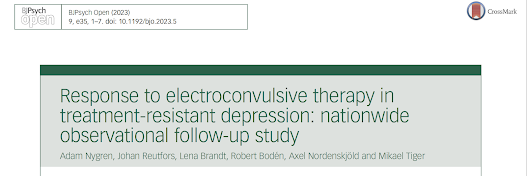ECT For TRD: New Registry Study From Sweden
Out on PubMed, from researchers in Sweden, is this study:
Response to electroconvulsive therapy in treatment-resistant depression: nationwide observational follow-up study.
BJPsych Open. 2023 Feb 14;9(2):e35. doi: 10.1192/bjo.2023.5.PMID: 36786152
The abstract is copied below:
Background: Previous studies have not investigated response rates after electroconvulsive therapy (ECT) in patients with non-psychotic treatment-resistant depression (TRD).
Aims: To assess and compare the response rate of ECT for patients with TRD and non-TRD, in a large and clinically representative patient sample.
Method: Patients aged ≥18 years, who were treated for a unipolar, non-psychotic depressive episode with at least one ECT session as part of a first-time, index ECT series between 1 January 2011 and 31 December 2017 were included from the Swedish National Quality Register for ECT. Patients who had initiated a third consecutive trial of antidepressants or add-on medications before start of ECT were classified as having TRD. Patients not meeting criteria for TRD were classified as non-TRD. The main outcome was response to ECT according to the Clinical Global Impressions - Improvement Scale (CGI-I), scored as 1 or 2 ('very much' or 'much improved' after ECT, respectively). Logistic regression was used to compare outcome measures between TRD and non-TRD, adjusting for potential confounders.
Results: A total of 4244 patients were included. Of these, 1121 patients had TRD and 3123 patients had non-TRD. The CGI-I response rate was 65.9% in the TRD group compared with 75.9% in the non-TRD group (adjusted odds ratio 0.64, 95% CI 0.54-0.75). Older age and more severe depression were predictors of response in patients with TRD.
Conclusions: A clear majority of patients with TRD, as well as patients with non-TRD, responded to ECT, although the response rate was somewhat lower for TRD.
Keywords: Depressive disorders; antidepressants; electroconvulsive therapy; epidemiology; outcome studies.
The article is here.
And from the text:
This is an important, well-conducted study. Once again, the Swedish registry data are mined to excellent effect. The findings are: ECT works well for both TRD and non-TRD, and that older age and greater depression severity are associated with better ECT outcomes.
Kudos to our Swedish colleagues for yet another fine contribution to the literature!






Comments
Post a Comment